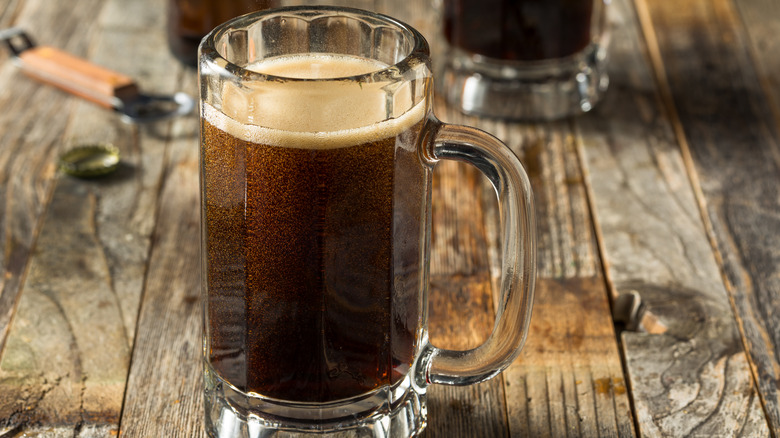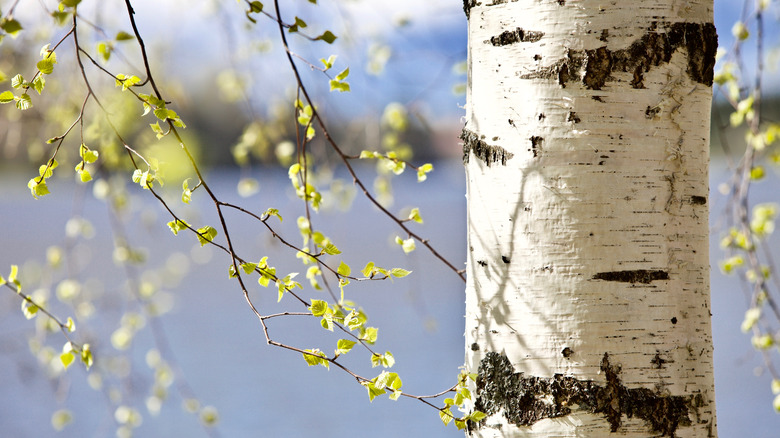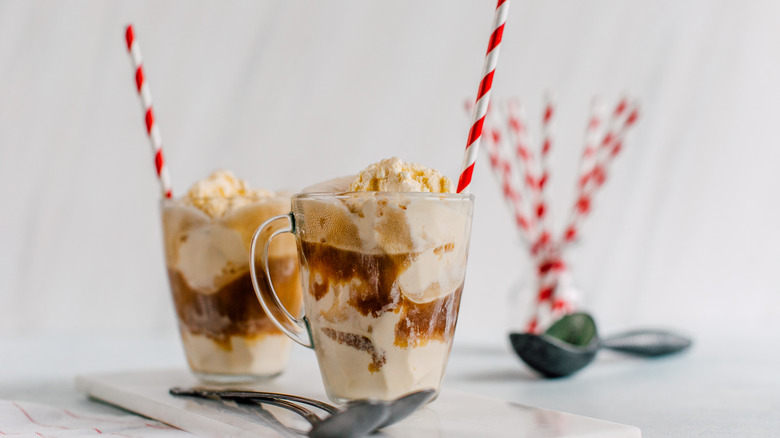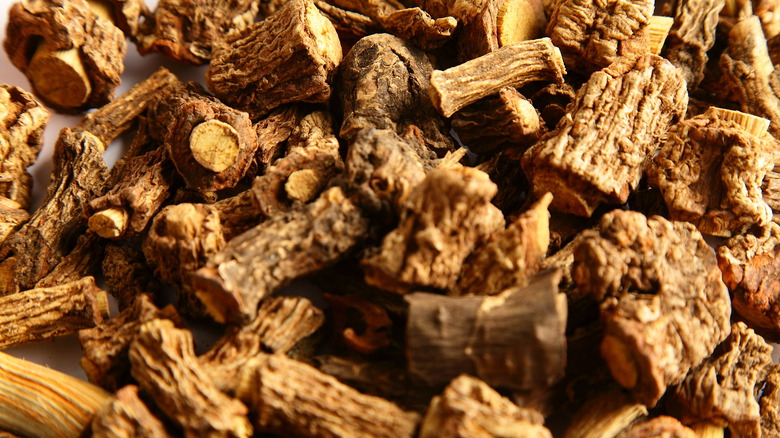The Real Difference Between Root Beer And Birch Beer
Root beers are often consumed alongside burgers or in ice cream sodas and are recognized the world over. On the other hand, birch beer tends to be adored in one little nook of the planet: the northeast United States, primarily within Pennsylvania. While root beer is not the top seller when it comes to carbonated soft drinks, it is nonetheless a reliable standby that always offers a nostalgic, fizzy flavor. Aside from drinking them, some also use the beverages in cocktails, desserts, and even savory dishes.
Both sodas can offer subtle notes of vanilla, cinnamon, and spice, while birch beer also has a subtle mint flavor. The brewing or fermentation process hasn't changed much at all since the original invention of the beverages, except for the fact that they are obviously now mass-produced. Most root beers and birch beers now contain some assortment of caffeine, artificial coloring, corn syrup, or other flavorings or additives. And while both products nowadays are primarily alcohol-free soft drinks, their original iterations once contained a trace amount of alcohol from the fermentation process. However, there are some "spiked" versions on the market, too (via Renegade Brewing).
With flavors that can be hard to pin down, what exactly are these drinks? What ingredients are paramount in their production? Are there major differences between the two? Let us answer these questions for you – and many more.
What is birch beer?
Renegade Brewing states that birch beer was first mentioned in John Mortimer's 1707 book "The Whole Art of Husbandry." In it, birch beer was pitched as a medicinal, curative beverage that would help to assail varying ails (much like many of the foods and drinks of the times). As Gastro Obscura notes, birch beer was a primary offering at soda fountains and pharmacies in the 19th century, when many ascribed to the notion that these fizzy drinks were curative or healing.
The drink was made by harvesting sap from birch trees and boiling it with sugar, yeast, and sometimes water, resulting in a fizzy, fermented beverage. In addition to sap, birch beer can also contain oil, twigs, and root. Modern Farmer notes that birch beer is often made with sap and bark from the black birch. As noted, the beverage is most consumed (and celebrated) throughout eastern Pennsylvania, where it achieved its cult classic status.
Modern Farmer notes that the flavor of birch beer is "significantly more complex" than root beer, indicating a "lightness and freshness" that boasts flavors of "wintergreen or teaberry herbiness." They go a step further, noting that birch beer often tastes clean, pure, and "primal," while root beer often has a more saccharine soda flavor that can be overwhelming or "cloyingly sweet." However, it is wise to avoid birch beer if you have a pollen allergy because it can often cause a reaction.
What is root beer?
An exercise in nomenclature, root beer is most certainly not "beer" as it is traditionally known. For those unfamiliar, root beer is a soda — often the color of cola — which has a sprightly, subtly "spicy" bite. As reported by Renegade Brewing, "root tea" was sold in the late 1800s by a man named Charles Elmer Hines — also as a curative — before being changed to "root beer." This change was supposedly made because beer was a much better seller at the time than tea was. Root beer is made with both sassafras (a root, hence the name) and sarsaparilla. Chicago Tribune notes that sassafras is a tree related to the laurel family, which can be used to make tea or file powder, a stew, or gumbo thickening agent.
Root beer also might contain varying herbs or spices, such as ginger, molasses, clove, or licorice. It also now contains caffeine, which its original iteration didn't.
Sarsaparilla vs. sassafras
Interestingly enough, most modern root beer is now made with artificial flavorings due to the fact that sassafras is said to have carcinogenic effects. McGill University notes that the specific problematic compound is called safrole. While sassafras and sarsaparilla were once the primary ingredients in the soda, the FDA's banning of the ingredient resulted in a near-complete overhaul of the once traditional recipe.
We know — it can be tricky to differentiate between all of the similar-sounding "s"-words. Here's a primer: one is the root of a plant (sarsaparilla), while the other is a vine from a particular tree (sassafras). Livestrong also notes that the sarsaparilla root or vine is said to alleviate stomach ailments and respiratory issues. Indeed, it was widely used by Native Americans.
No matter if you're sipping on root beer or birch beer, they're both delicious, unique beverages that can spruce up any meal, shindig, or get-together. You can also consume it alone while basking in the glow of your TV. Enjoy!



